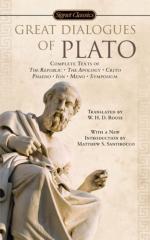
|
| Name: _________________________ | Period: ___________________ |
This quiz consists of 5 multiple choice and 5 short answer questions through Republic: Book III.
Multiple Choice Questions
1. Whose stories does Socrates think dangerous for the moral turpitude of his city's citizens?
(a) Various works by Pindar.
(b) Hesoid's Theogeny.
(c) Heretical poetry by Shakespeare and Ben Johnson.
(d) Aristotle's Poetics.
2. Who is Eryximachus?
(a) A doctor who argues that love is like a medicine curing life's ailments.
(b) A poet who argues that men and woman were once fused beings.
(c) The last speaker and surprise guest at the symposium.
(d) A philosopher who attacks Pausanias' postion.
3. Who said the following: "may not the art of which neither teachers nor disciples exist be assumed to be incapable of being taught?"
(a) The slave boy.
(b) Socrates.
(c) Meno's wife.
(d) Meno.
4. What is a symposium?
(a) An all- night drinking party where various elite Greeks discuss the meaning of love.
(b) An outdoor gathering of philosophers near a nobleman's residence.
(c) A small club of Sophists.
(d) An ancient restaurant.
5. How does Socrates rebut the definition of virtue offered by the poets?
(a) By instructing Meno that it is impossible to have an abstract entity which moves other things but does not move itself.
(b) By proving to Meno that there are many commonly held virtues.
(c) By showing Meno that all men desire good things, but that not all men are virtuous.
(d) By giving Meno a solid definition of virtue.
Short Answer Questions
1. When he first meets Socrates, Meno asks the following question:
2. In the dialogue, Meno blames the confusion in his speech on which of the following?
3. When Meno arrives in Athens, who is accompanying him?
4. When Ion admits to Socrates that he can only recite one poet's work well, Socrates is puzzled by which of the following?
5. Why is Socrates worried about literature which contains wayward characters?
|
This section contains 438 words (approx. 2 pages at 300 words per page) |

|




